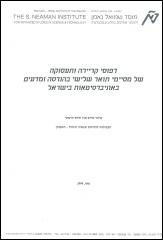This research deals with successful careers of holders of a third academic degree in engineering and exact sciences who received their degrees in the years 1987, 1989 and 1992. The research describes the level of graduates’ success in objective terms such as: salary, scientific publications and lectures at conferences, and in subjective terms such as: inner satisfaction, satisfaction from salary, prospects for promotion, and intention to emigrate. The research also describes the personal characteristics of the degree holders and the characteristics of the environment into which they were integrated. The research variable was measured with the aid of a questionnaire which was answered by 330 people. The main finding show that 90% of the respondents who are in the country work or study towards their post-doctorate. 65% are in academia. Their salary level is, on the average, between NIS3000.- and NIS5000.- a month. Scientific fertility is expressed by the median grade of 7 articles and 3 lectures at scientific conferences. Only 4% have not published a single article since receiving their third degree.
Inner satisfaction of the respondents is high and most of them note that there is congruence between the training they received and the position they hold. Satisfaction from salary and prospects for promotion is low. Most of the respondents show a clear preference for working in academia or R&D. About 80% of them think that the prospects of their working in academia have worsened. 22% think that the prospects of their working in R&D have lessened because of the immigration from Russia. About a quarter of the degree recipients were abroad during the research, most of them for post-doctoral studies. Half of the respondents firmly noted that they had no intentions of emigrating permanently, and 40% noted they were interested in temporary emigration for professional development. Temporary emigration constitutes a personal and national contribution since those returning home bring with them a higher level of know-how and greater repute in the scientific community compared to their previous situation. On the other hand, the fact that about a quarter of the respondents was abroad, and conside the situation as more difficult in the area of employment, might end in permanent emigration, causing the country great damage.
Nearly half the respondents pointed to the immigration from Russia as the source for difficulties in finding work in research. This finding carries an important message to policy makers, implying the need to create more opportunities for work in academia and R&D to prevent a brain drain in the future.












